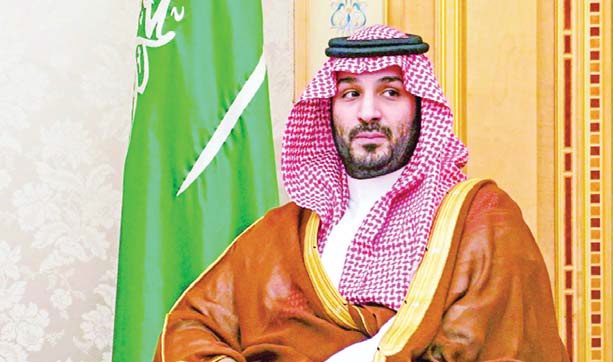- Home
- Editorial
THE SAUDIS: PEACEKEEPERS OR POWER BROKERS?
Young Bites. Dated: 4/22/2025 11:53:25 AM

NILANTHA ILANGAMUWA In a transformation as ambitious as it is paradoxical, Saudi Arabia is rebranding itself from an austere theocracy to a cosmopolitan architect of global diplomacy. This evolution raises a fundamental question: can a state rewrite its past without reckoning with it? The transformation of the Kingdom of Saudi Arabia from a puritanical theocracy to an aspiring architect of global peace is one of the most paradoxical and politically engineered evolutions of the modern era. Far from the deserts where Wahhabism first struck its austere roots, the Kingdom now positions itself as a mediator between global powers, a patron of modernity, and a crucible of cross-cultural aspiration. Yet beneath the glistening architecture of NEOM and the diplomatic smiles of peace summits lies a stratified narrative — one obscured by revisionist theatre and gilded silence. Saudi Arabia’s foundation in 1932 under King Abdulaziz Ibn Saud was not merely a unification of tribal territories; it was a theological consolidation. The strategic pact with Muhammad ibn Abd al-Wahhab, brokered generations earlier, transformed Islam into an instrument of statecraft. As the CIA Handbook observed in 1972, “The Saudi Government is a monarchy based on a fusion of secular and religious authority, with the King at its apex.” The same report stated, “The royal family dominates both the political and economic life of the country,” a candid admission of dynastic monopolisation. Governance was less institutional than charismatic, mediated through familial bonds, tribal allegiances, and theocratic endorsement. The Kingdom’s export of Wahhabism, particularly from the 1960s onward, became one of the most under-scrutinised forms of ideological colonisation. Flush with petrodollars after the 1973 oil embargo — an embargo that King Faisal declared in defence of Arab dignity, stating, “Our oil is our weapon, and we will use it to protect our Arab rights”— Saudi Arabia embarked on a global proselytisation project. Mosques, madrassas, and clerical scholarships were funded from Islamabad to Jakarta, Sarajevo to Khartoum, shaping generations in an image that often opposed indigenous Islamic traditions. A lesser-known revelation from a declassified 1981 US State Department cable noted: “Saudi financial support to Islamic institutions in Southeast Asia has significantly altered the religious landscape, prioritising doctrinal rigidity over cultural synthesis.” The domestic reality, too, remained draconian under the veneer of religiosity. The 1979 Grand Mosque seizure by a fundamentalist group paradoxically catalysed a more regressive clampdown, as the royal family tightened its alliance with the religious establishment to legitimise its authority. It is telling that King Fahd, who in the 1980s declared, “We will build the future without abandoning our past,” presided over an era where ministries functioned as courtiers rather than administrators. As noted in a 1972 CIA internal report, “Much of the bureaucracy remains inefficient, with key decisions often bypassing formal channels and handled by royal intermediaries.” The paradox deepens when juxtaposing Saudi Arabia’s financing of foreign conflicts with its self-portrayal as a stabiliser. The Kingdom, directly or through proxies, has been implicated in the fomentation of conflict zones including Afghanistan, Syria, Yemen, and Libya. In Yemen, particularly, its military intervention since 2015 has left an indelible humanitarian scar. UN estimates suggest over 375,000 deaths, mostly from indirect causes. Despite this, Riyadh now courts global opinion as a peace broker, hosting summits that purport to end the very conflicts it helped perpetuate. This performative peacemaking is a diplomatic palimpsest, rewriting its culpability in real time. The chilling assassination of journalist Jamal Khashoggi in 2018 inside the Saudi consulate in Istanbul became a gruesome watermark of the state’s coercive architecture. But can a state undergo ontological transformation without historical accountability? Can it broker peace while archives of complicity remain sealed? The Kingdom’s diplomatic epistles, such as the declassified 1973 letter from the US President to King Faisal praising him as “a voice of wisdom and reason,” read today as documents of strategic appeasement, not genuine admiration. Indeed, what Saudi Arabia seeks now is not reinvention but redemption. It seeks to transmute petrodollar moral hazard into soft power prestige. In doing so, it exploits the cognitive dissonance of the global order: that authoritarianism, when efficient and well-funded, can be tolerated, even admired. Perhaps this is the Kingdom’s most radical export yet — a model where ideological elasticity replaces democratic legitimacy. (Courtesy: Daily Pioneer/(The writer is a Colombo-based journalist. Views are personal)